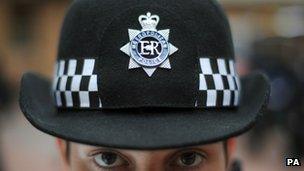Queen's Speech: Anti-social behaviour changes proposed
- Published

Police would be forced to act against anti-social behaviour once five people had complained
Almost 20 powers to deal with anti-social behaviour would be replaced with six, under government plans outlined in the Queen's Speech.
The rights of victims would be the focus, with quick action taken to deal with persistent anti-social behaviour, details revealed in Parliament showed.
Under the crime and policing bill, forced marriage would become a criminal offence.
Offences for owning dangerous dogs and illegal firearms would be introduced.
The Queen's Speech, delivered during the State Opening of Parliament, allows the government to set out its proposed bills for the next parliamentary session.
'Community trigger'
The crime bill includes the new "community trigger", where police, councils and agencies would be forced to act if five households made a complaint about anti-social behaviour.
There would also be the "community remedy", which provides a greater say for victims in what form of sanction an offender can receive out of court.
Other main elements of the crime bill include:
A breach of the forced marriage protection order to be criminalised
A dog attack on an assistance dog to become an aggravated offence
The offence of owning or being in charge of a dog that is out of control in public to be extended to private places
The maximum penalty for illegal importation and exportation of firearms to be increased, and a new offence of possession for sale or transfer created
The bill also covers policing. The Police Negotiating Board would be replaced with the Police Remuneration Review Body, and the Crown Prosecution Service Inspectorate would provide independent inspection of the Serious Fraud Office.
Police and crime commissioners would be given responsibility for commissioning victims' services, "rectifying anomalies in the framework of financial controls on chief officers" and arrangements for British Transport Police firearms officers.
Extradition Act
The bill also says that the speed and efficiency of the justice system's response to "low-level offending" would be improved by enabling police to prosecute uncontested minor offences of shoplifting.
It would also establish in law a test of "clear innocence" for determining eligibility for compensation in miscarriages for justice cases.
The bill would also ensure that offenders sentenced to custody would have to contribute to the Victims Surcharge - by removing the power of magistrates to add additional days to a sentence in lieu of payment.
The Victims Surcharge is payable when a person is sentenced to a conditional discharge, a fine, a community or a custodial sentence, and is used to fund victims services.
The government also wants to "strengthen public confidence in... extradition arrangements" by amending the Extradition Act 2003 and implementing the recommendations from former Court of Appeal judge Sir Scott Baker.
Sir Scott was asked in 2011 by the home secretary to review extradition arrangements.
- Published8 May 2013
- Published7 May 2013
- Published25 April 2013
- Published17 March 2013
- Published7 March 2013